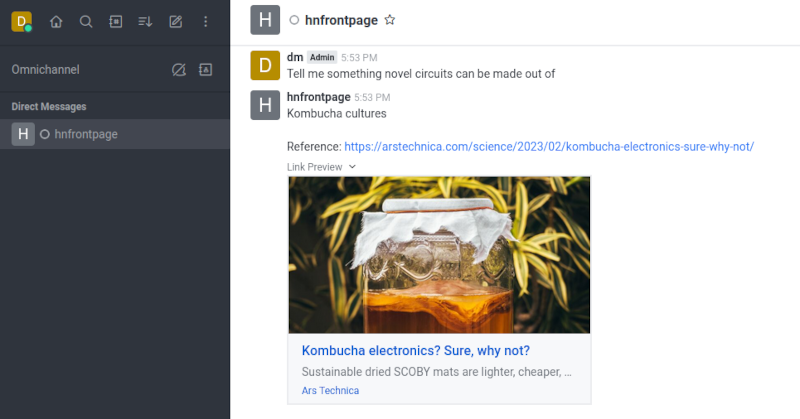Txtchat Save
💭 Retrieval augmented generation (RAG) and language model powered search applications

Retrieval Augmented Generation (RAG) powered search
txtchat builds retrieval augmented generation (RAG) and language model powered search applications.

The advent of large language models (LLMs) has pushed a reimagination of search. LLM-powered search can do more. Instead of just bringing back results, search can now extract, summarize, translate and transform content into answers.
txtchat adds a set of intelligent agents that are available to integrate with messaging platforms. These agents or personas are associated with an automated account and respond to messages with AI-powered responses. Workflows can use large language models (LLMs), small models or both.
txtchat is built with Python 3.8+ and txtai.
Installation
The easiest way to install is via pip and PyPI
pip install txtchat
You can also install txtchat directly from GitHub. Using a Python Virtual Environment is recommended.
pip install git+https://github.com/neuml/txtchat
Python 3.8+ is supported
See this link to help resolve environment-specific install issues.
Messaging platforms
txtchat is designed to and will support a number of messaging platforms. Currently, Rocket.Chat is the only supported platform given it's ability to be installed in a local environment along with being MIT-licensed. The easiest way to start a local Rocket.Chat instance is with Docker Compose. See these instructions for more.
Extending txtchat to additional platforms only needs a new Agent subclass for that platform.
Architecture


A persona is a combination of a chat agent and workflow that determines the type of responses. Each agent is tied to an account in the messaging platform. Persona workflows are messaging-platform agnostic. The txtchat-persona repository has a list of standard persona workflows.
- Wikitalk: Chat with Wikipedia
- Summary: Reads input URLs and summarizes the text
- Mr. French: Translates input text into French
See the examples directory for additional persona and workflow configurations.
The following command shows how to start a txtchat persona.
# Set to server URL, this is default when running local
export AGENT_URL=ws://localhost:3000/websocket
export AGENT_USERNAME=<Rocket Chat User>
export AGENT_PASSWORD=<Rocket Chat User Password>
# YAML is loaded from Hugging Face Hub, can also reference local path
python -m txtchat.agent wikitalk.yml
Want to add a new persona? Simply create a txtai workflow and save it to a YAML file.
Examples
The following is a list of YouTube videos that shows how txtchat works. These videos run a series of queries with the Wikitalk persona. Wikitalk is a combination of a Wikipedia embeddings index and a LLM prompt to answer questions.
Every answer shows an associated reference with where the data came from. Wikitalk will say "I don't have data on that" when it doesn't have an answer.
History
Conversation with Wikitalk about history.
Sports
Talk about sports.
Culture
Arts and culture questions.
Science
Let's quiz Wikitalk on science.
Summary
Not all workflows need a LLM. There are plenty of great small models available to perform a specific task. The Summary persona simply reads the input URL and summarizes the text.
Mr. French
Like the summary persona, Mr. French is a simple persona that translates input text to French.
Connect your own data
Want to connect txtchat to your own data? All that you need to do is create a txtai workflow. Let's run through an example of building a Hacker News indexing workflow and a txtchat persona.
First, we'll define the indexing workflow and build the index. This is done with a workflow for convenience. Alternatively it could be a Python program that builds an embeddings index from your dataset. There are over 50 example notebooks covering a wide range of ways to get data into txtai. There are also example workflows that can be downloaded from in this Hugging Face Space.
path: /tmp/hn
embeddings:
path: sentence-transformers/all-MiniLM-L6-v2
content: true
tabular:
idcolumn: url
textcolumns:
- title
workflow:
index:
tasks:
- batch: false
extract:
- hits
method: get
params:
tags: null
task: service
url: https://hn.algolia.com/api/v1/search?hitsPerPage=50
- action: tabular
- action: index
writable: true
This workflow parses the Hacker News front page feed and builds an embeddings index at the path /tmp/hn.
Run the workflow with the following.
from txtai.app import Application
app = Application("index.yml")
list(app.workflow("index", ["front_page"]))
Now we'll define the chat workflow and run it as an agent.
path: /tmp/hn
writable: false
extractor:
path: google/flan-t5-xl
output: flatten
workflow:
search:
tasks:
- task: txtchat.task.Question
action: extractor
python -m txtchat.agent query.yml
Let's talk to Hacker News!

As you can see, Hacker News is a highly opinionated data source!
Getting answers is nice but being able to have answers with where they came from is nicer. Let's build a workflow that adds a reference link to each answer.
path: /tmp/hn
writable: false
extractor:
path: google/flan-t5-xl
output: reference
workflow:
search:
tasks:
- task: txtchat.task.Question
action: extractor
- task: txtchat.task.Answer







